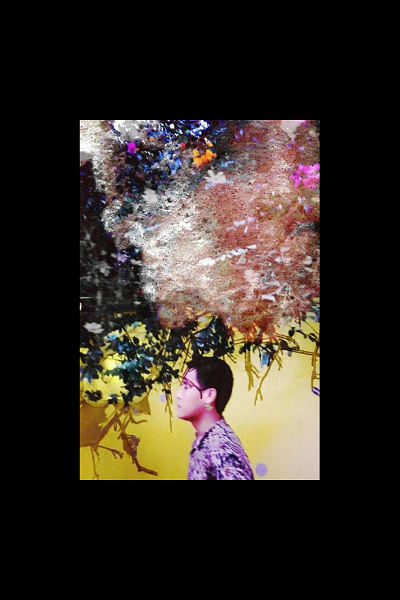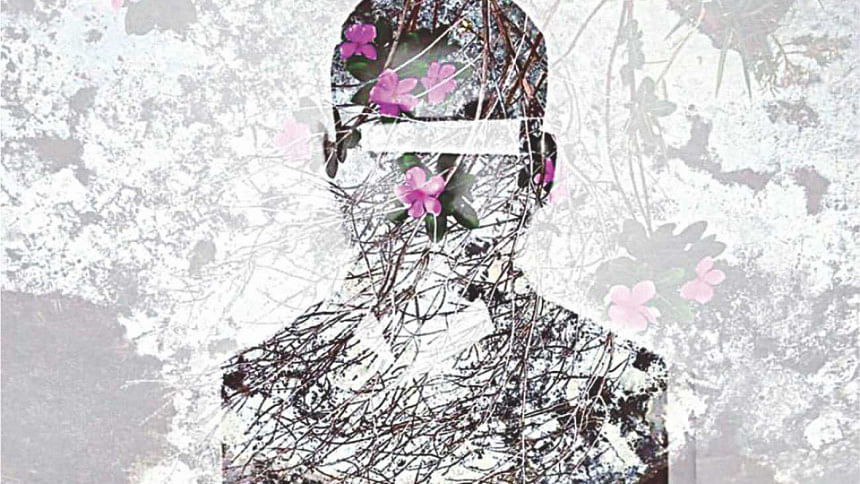Let there be light

You cannot always tell by looking
"What does depression look like?" 28-year-old Nazia Islam (not her real name), a depression survivor asks.
"Suffocating? Abstract? Obscure?"
Nazia pauses for a moment and continues, "I don't remember what triggered depression in me."
"But three years ago, I would wake up, paralysed by anxiety and guilt. Most mornings, I would start my day, feeling empty – free of ambitions and motivation. My thoughts would not flow. I was losing appetite, and slowly, I was losing interest in all the things that I used to love once. Someday I would feel euphoric and spend hours thinking about my skills and dreams of starting my own business, and picking up music lessons. But at the end of the day, they would seem unreachable; I felt lost and burnt out."
For days on end, she would seek refuge in sleeping, and every morning, she would struggle to pull herself out of bed.
"They say crying is cathartic. I tried crying, but it felt as though I didn't have any more tears left. Then again, some days, I would cry for no apparent reason," she shares.
This whole time, Nazia says, she was putting up a front of a "normal" person – sleeping-waking up-waiting-going outside-working-coming back home-sleeping – while constantly wrestling with her thoughts and emotions.
"From the outside, I seemed in control of things, but it was exhausting to do that. For me, depression did not have a face, which made it more difficult for me to explain to people what was happening inside my head," she adds.
According to a recent WHO study, "Depression and Other Common Mental Disorders, WHO – 2017," it is estimated that in Bangladesh, 4.1 percent of the population have depression, and 4.4 percent suffer from some form of anxiety disorder. However, this estimated data could be an underestimation as many patients tend to not talk about it due to strong stigma attached to it.
The statistics hint that, like Nazia, there could be one or more persons in your social circle or family who are going through the same struggle, and you don't have a clue about it.

In fact, depression is one of the most common mental health issues in Bangladesh, and it affects so many people worldwide that it is often called the "common cold of mental illnesses".
But unfortunately, depression also happens to be a term that is often misunderstood, vaguely applied and interchangeably used with a sudden blue feeling or a temporary disappointment. In reality, major depressive disorder is far more devastating than, what we, in layman's terms, call being sad. It is an ailment, just like any other physical ailment – like migraine, cancer or diabetes – that too demands to be acknowledged and treated with care, understanding and compassion.
"Depression often comes with ignorance, denial and suppression," says Dr Golam Rabbani, psychiatrist and chair of Neuro-Developmental Disability and Protection Trust. "The signs and symptoms can vary from person to person. But anhedonia – loss of interest in previously rewarding activities including their hobbies, food, work, friends, even sex – is a core symptom of depression. Feelings of helplessness and hopelessness, self-loathing, agitation and changes in appetite and sleeping patterns are also important indicators of depression. Severe depression may be accompanied by auditory hallucination, which might lead to consequences like self-harm and suicide," he adds.
It's important to remember that these symptoms can also be a part of life's normal lows, and unlike other mental disorders, people suffering from depression don't necessarily show any recognisable symptoms.
"But if you start demonstrating these symptoms for a longer period of time, and more frequently, chances are high that you are dealing with depression," says Dr Rabbani.
"It is your own fault"
Nazia Islam (yes, not her real name) agreed to talk about her condition, but she was not willing to share her name. And that's where the stigma lies.
Despite the prevalence of depression around the world and in Bangladesh, it remains a taboo that can only be discussed in hushed tones, or not at all.
Depression is often seen as a sign of weakness, a character flaw or a made-up, luxurious affliction, but not a serious illness.
In fact, there is a great deal of stigma and shame attached to it, which results in a huge number of people with clinical depression not being treated for their symptoms.

"When we choose to stigmatise any kind of illness, it is because we don't educate ourselves enough to understand the situation," Dr Rabbani says. "Historically and culturally, in Bangladesh, people with mental illness are often negatively stereotyped as a dangerous species. Instead of delving further into the issue, rebuking and tagging the sufferer with titles like crazy, and lunatic seems a more likely option to us."
Unfortunately, this bias, sometimes, is also evident among health care providers and mental health professionals. It results in social distancing and social rejection, which can actually worsen the well-being of people with mental illness in various ways, he adds.
And stigmatising depression does not always mean shunning the person from the social circle; trivialising what the person is feeling by giving thoughtless "advice" and dismissing their conditions also perpetuates stigma.
"One morning, unable to get up from bed, I called my supervisor saying I cannot come to office today," Nazia says.
"She asked me what happened, and I somehow gathered courage to explain to her my mental condition. I got the day off, but I was also told that this cannot be a valid reason to skip work. Her remarks made me feel more misunderstood, so I shut down further."
Her productivity and achievements at work were helping her deal with depression, but soon, she started feeling ostracised by her colleagues who would paint her as 'mad', and 'incapable'. "I began to blame myself. I was already helpless, and it was easy for me to adopt their views and think of myself as a weak, lazy person, like they said," she continues. "Ironically, they were the same people who hailed Bollywood actress Deepika Padukone's confession of dealing with depression as a triumph in fighting the stigma of mental illness, but I could never make my case to them."
Nazia started suppressing her feeling further. One morning she decided to quit her job.
"Now that I didn't have a job, I started feeling worthless and unproductive. That was when I started thinking of killing myself," Nazia says matter-of-factly.
Nazia admits she was afraid that disclosing her mental condition would not only bring shame to her, but to her entire family. So why not suffer in silence?
Unfortunately, the stigma does not only affect the patient on a personal level, it also complicates the care and resources available for the mentally ill. Common mental disorders lead to considerable losses in health and functioning, and if left untreated and misunderstood for years, the number could increase at an alarming rate. Therefore, it is important to reduce the stigma of mental health disorders to enable more people to seek help.
Let's talk
Depression is not just the result of a chemical imbalance in the brain but is a combination of biological, psychological and social factors.
And therefore, it is more complicated to treat.
"But it is treatable, and that is the good news," says Nazia.
"At one point, my life did not seem worth living, and I started inflicting pain on myself. There were more and more self-inflicted cuts on my body. My guilt was all-consuming, and I gave up putting a brave face on. I was not terrified anymore, of anyone finding out about my condition. In fact I became distant from my friends and family, and my body also started showing physical symptoms – palpitations, panic attacks, headache, exhaustion and fatigue."
The moment her depression became somewhat visible, her parents intervened and convinced her to see a therapist.
"In my first session, I was sceptical and silent. But slowly my therapist introduced me to a holistic treatment that included physical activities, medication, psychotherapy and individual sessions. I took it slow, but over the past few months, I have developed a healthy and positive attitude towards life. I have not started working yet, and I am not rushing it either. But the point is – it's important to fight against stigmatisation, by coming out and talking about it, even if you have not ever experienced clinical depression yourself."
It is estimated that by 2020 depression will be the second most important cause of disability globally. Leaving it untreated can further contribute to that growing number.

"While friends and family can be a source of encouragement and confidence, they are usually in an urgency to help, because they care so much," says Shamsin Ahmed, Project Director of 'Identity Inclusion', a project countering mental health stigma and promoting community based mental health services. "While validation is important, it is equally important for those suffering from depression to regain confidence by finding the means to help themselves. A counsellor or other psychological professionals have the proper skills to probe and listen objectively to help people identify where exactly the lack of confidence lies and what they can do about it, by themselves."
Mental illnesses are now being referred to as psycho-social disabilities because 'illness' as opposed to 'disability' does not take into account the pervasive stereotypes and attitudes that result in inequalities that affect people with mental health conditions, opines Shamsin.
"Psycho-social support, hence, is the kind of support that helps break the barriers that hinder people with mental illnesses from participating in society. Hence what we do at Identity Inclusion is we identify the specific barriers people face – for example, if someone is deprived of going to school because they have a condition and no school will accept them, we support them in finding a supportive school or educating a school to accommodate their needs; we also help them build their confidence and enable them to access moral and institutional support."
We cannot say with certainty that the stigma surrounding mental health has reduced to a great extent. Dr Rabbani, however, is hopeful that conversations are now taking place in the open.
"The fact that the theme for this year's World Health Day is 'Depression: Let's talk' is itself a great stride towards that," he says. "This proves that we are considering mental health conditions like depression as a health issue, and with that, we are acknowledging that mental and physical health should not be thought of separately."
Despite all these numbers and studies and "real" people dealing with such a complex psychological ailment, many will still try to pretend that depression does not really exist.
We need to reinforce the fact that admitting that you have depression does not make you an incapable person. Asking for professional help does not mean personal weakness.
In fact it takes a lot of courage to come out and talk.
And it's time to talk.

 For all latest news, follow The Daily Star's Google News channel.
For all latest news, follow The Daily Star's Google News channel. 



Comments